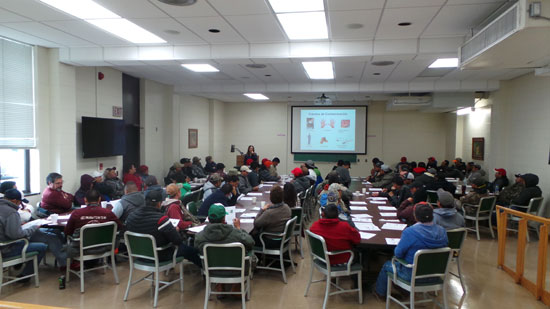With funding from USDA NIFA award number 2017-70020-27236, Penn State Extension educators from the Food Safety and Horticulture teams developed bilingual Produce Safety educational materials and delivered trainings to Latino Fresh Produce Growers and Farmworkers in Pennsylvania.
“In this pilot project, Penn State Extension educators worked closely with Latino farmers and farmworkers to identify training needs within the community and developed high-impact bilingual food safety training programming. The goal was to develop a suite of educational materials in English and Spanish and deliver bilingual trainings to address the language barrier for successful implementation of farm food safety practices including some of the concepts covered by the FSMA Food Safety Rule and to help food safety managers who attended the Food Safety Modernization Act’s Produce Safety Rule training to communicate the knowledge to others on the farm”, said Maria Gorgo-Gourovitch, the principal investigator of this grant. Other members of the team were Megan Chawner, Tara Baugher, Jeffrey Stoltzfus, Don Seifrit, Christi Graver, Professor of Food Science Dr. Luke LaBorde and now retired extension educator Lee Stivers.
While the U.S. has one of the safest food supplies in the world, Congress entrusted the FDA to implement the Food Safety Modernization Act (FSMA). This new law changed the food safety system from one that responds to contamination to one that prevents it in the first place. Among the suite of new regulations issued under the law is “Standards for the Growing, Harvesting, Packing, and Holding of Produce for Human Consumption” (USFDA, 2013) commonly known as the “Produce Safety Rule.” The Produce Safety Rule poses new regulatory challenges to the fresh produce industry in Pennsylvania and across the country. Latino growers and farmworkers had an unmet need for accessible Food Safety and Good Agricultural Practices (GAP) information, education, and resources. In order to provide short, easy-to-understand information, Extension focused their educational materials and trainings on topics such as personal hygiene, microorganisms and sources of contamination during, before and after harvest.
The Extension team began by collecting, assessing, and archiving pre-existing educational materials related to FSMA and Farm Food Safety education available at the Penn State website. They identified gaps in programming in regards to content and methodology. As a result, 10 articles and 2 fact sheets were translated. The team reviewed and updated the Food Safety Training Kit and the GAP posters to match new PSA curricula and created a catalogue of available information in English and Spanish.
With support from stakeholders, Extension determined where the greatest needs in programming were and then developed new educational materials and workshops specific to various industry groups.

The team created a number of innovative, new food safety (GAPs) outreach, education, and training programs in English and Spanish, including 11 trainings and professional development with a total of 24 presentations.
To find all the newly available resources, please visit Penn State Extension website at https://extension.psu.edu/bilingual-produce-safety-education


